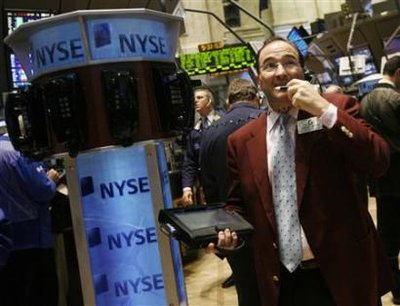Updated: 2008-11-20
(China Daily) NEW YORK -- Stocks plunged to their lowest in five-and-a-half years on Wednesday as investors girded for a lengthy economic downturn and automotive executives predicted a far-reaching calamity without a government lifeline.
 Traders work on the floor of the New York Stock Exchange, November 19, 2008. [Agencies] |
Shares of General Motors Corp plummeted to the lowest in 66 years and Ford hit a 26-year low, but the pain was spread well beyond the automotive sector. Financial shares fell by double-digit margins as a meltdown in the commercial real estate market fanned fears of another wave in the credit crisis.
Late in the day, the Federal Reserve slashed its economic growth forecasts through 2009, helping unleash a wave of selling that continued into the closing bell.
"We're witnessing the worst market crash in most people's lifetimes," said David Bianco, chief US equity strategist at UBS in New York. "People seem to enjoy telling each other how bad its going to get and working themselves into a frenzy. It's just becoming silly."
The Dow Jones industrial average tumbled 427.47 points, or 5.07 percent, to 7,997.28. The Standard & Poor's 500 Index fell 52.54 points, or 6.12 percent, to 806.58. The Nasdaq Composite Index lost 96.85 points, or 6.53 percent, to 1,386.42.
It was the first time the Dow closed below the 8,000 level since March 2003. The S&P 500 and the Nasdaq broke through last week's intraday lows, which were the lowest in more than five years.
GM's stock cut its loss for the day almost in half, but still ended down 9.7 percent at $2.79 after earlier dropping to a 66-year low. Rival Ford sank 25 percent to $1.26 as investors worried about the possibility that there will be no quick proposal from Congress to resolve the problems hounding the auto industry before its session draws to a close.
US auto executives were on Capitol Hill for a second day to plead their case for a $25 billion aid package. Prospects for a bailout getting done this week remained uncertain, even as legislators proposed compromises to the original plan.
Investors are concerned about how a possible bankruptcy filing by US automakers could further hurt an already fragile economy.
In the financial sector, Bank of America, JPMorgan Chase & Co and Citigroup all slid to multiyear lows on persistent worries about the fallout that worsening credit and a contracting economy will have on banks.
Bank of America was down 14 percent at $13.06, JPMorgan shed 11.4 percent to $28.47 and Citigroup lost 23.4 percent to $6.40. The S&P financial index skidded 11.6 percent.
Adding to concerns about the financial sector's health, bonds with exposure to commercial real estate experienced a meltdown on worries that the ailing economy could lead to a round of defaults on loans for office buildings, retail stores and hotels.
The Fed lowered its forecast range for 2008 gross domestic product growth and said the economy could shrink by 0.2 percent in 2009. Minutes from the Fed's most recent policy meeting also showed some officials believed even more interest rate cuts may be needed as the economy falters.
The Fed cut its fed funds rate to 1 percent from 1.5 percent at its scheduled meeting last month, part of an aggressive rate-cutting campaign that has taken the benchmark rate for overnight bank loans down 3.25 percentage points since the beginning of the year.
Also on the economic front, US consumer prices fell at a record pace in October and home building sagged to new lows, according to data that suggested the economy is already in a recession that could become prolonged.
On Nasdaq, Yahoo Inc slumped 20.9 percent to $9.14 after Microsoft Corp's chief executive ruled out an acquisition of the Internet media company, saying his company was interested in restarting talks on a Web search partnership.
Trading volume was active on the New York Stock Exchange, with about 1.64 billion shares changing hands, below last year's estimated daily average of roughly 1.90 billion, while on Nasdaq, about 2.36 billion shares traded, above last year's daily average of 2.17 billion.
Declining stocks outnumbered advancing ones on the NYSE by a ratio of about 16 to 1, while on the Nasdaq, more than eight stocks fell for every one that rose.








No comments:
Post a Comment